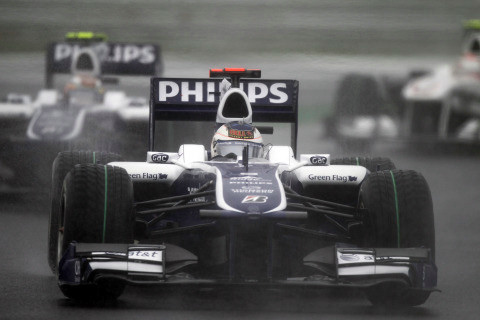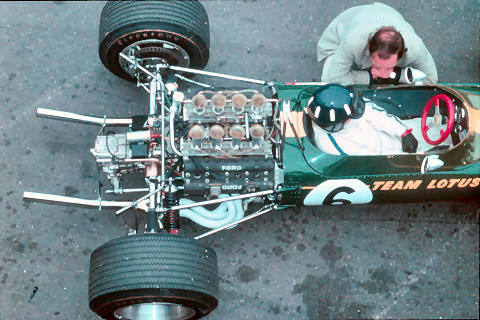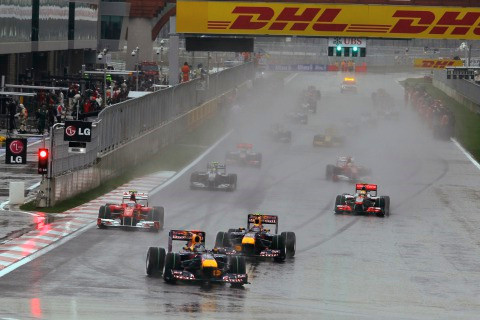The Way It Is/ Cosworth's view of racing's future
by Gordon Kirby After a five-year absence Coworth returned to Formula One this year, supplying engines to Williams, Lotus, Virgin and HRT. In the wake of the recent withdrawals from F1 of Honda, Toyota and BMW the return of Cosworth was a godsend for Grand Prix racing ensuring a full field in difficult economic times. And what a great job Cosworth has done, enabling Williams occasionally to challenge the big factory-backed teams and providing the most reliable engine in the field.
After a five-year absence Coworth returned to Formula One this year, supplying engines to Williams, Lotus, Virgin and HRT. In the wake of the recent withdrawals from F1 of Honda, Toyota and BMW the return of Cosworth was a godsend for Grand Prix racing ensuring a full field in difficult economic times. And what a great job Cosworth has done, enabling Williams occasionally to challenge the big factory-backed teams and providing the most reliable engine in the field.
Tim Routsis has been Cosworth's CEO since the fall of 2003. Routsis joined Cosworth from Pi Research which is owned by Cosworth and is one of the company's key divisions.
Cosworth was bought in 2004 by Kevin Kalkhoven and Jerry Forsythe. With Kalkhoven and Forsythe's enthusiastic support and under Routsis's direction Cosworth has undergone a broad expansion and diversification into other businesses, including aerospace and defense work, automotive aftermarket and engine development, marine technology and wind power and other forms of clean technology. An important part of Cosworth's diversification has been applying Pi's electronic data gathering and monitoring systems to many of these other segments of the company's business.
The motivation for Cosworth's diversification was to find a better business model rather than focusing on building F1 and Indy car engines. This longtime basis for most of Cosworth's income began to unravel as a record number of manufacturers dominated F1 and CART/Champ Car began to fail.

© LAT USA
"There is now definitely a much greater focus and demand for a product that is not only competitive and reliable but it's actually affordable within the ability of the sport's participants to pay for out of TV money and sponsorship revenues without having to rely on the discretionary spend of enormous multi-nationals to keep the series afloat.
"Formula One is an area where Cosworth has excelled for many, many years and what we're seeing this year is that capability hasn't been lost in any shape or form," Routsis added. "I think the future of the sport is going to be where generally we're going to see a greater awareness of value rather than just the ability to outright spend."
Although designing and building racing engines no longer is the primary component of Cosworth's business operations the company intends to continue in F1 and hopes to attract a major manufacturer to become a technology and financial partner for the still to be determined 2013 formula.
Back in 2005 Cosworth was driven out of F1 as a spending war between a record number of eight manufacturers reached new heights. But as the bubble burst a new economically-driven attitude has started to forcibly overtake F1 and this approach is at the heart of the FIA's effort this year to adopt a new, more cost-effective formula for 2013.
"I think the sport has some challenges in front of it," Routsis commented. "It has to address its perceived image of offensive excess in certain areas. That is certainly something that is recognized by the thinking people within the operations of Formula One. A huge amount of effort is being put in place to try and map out a future which preserves the things that are best about Fomula One but equally recognizes that the world is a changing place and Formula One has to fit with the world. It cannot take a risk of becoming anachronistic because if it does, it won't have a future."
Routsis is in full agreement with the FIA that F1 must embrace an entirely new approach to the future with its new formula.
"To that end, as you know, there's been a lot of debate about the shape future powertrains ought to take," Routsis said. "It's a very complex, multi-dimensional and arguably pretty intractable problem which has absorbed a lot of time from quite a few people for the best part of a year now to try to map out what the future ought to be.
"I think the areas of broad agreement are that a sport which can demonstrate the ability to perform at the same level as it does today but using significantly less fuel resources is a good place to be. The area which is still taking an amount of work is how do we change that road map from where we are today to that kind of a future without triggering a spending war.
"Every participant, either current or potential, agrees that nobody wants a spending war. I'll go further to say that many people are simply not prepared to sign up to something which even risks a spending war. That is something which I think is very good for the sport and Cosworth is absolutely central to that. There are only a very limited number of chairs around the table in that debate and we're fortunate enough to have one of those chairs."
Routsis is equally convinced that Cosworth will have to provide complete powertrain solutions, including KERS and other energy-preserving devices.

© LAT USA
Routsis is a supporter of the FIA's concept of a small capacity, turbocharged four-cylinder engine for F1. But he has serious reservations that the broader 'Global Racing Engine' proposed as the base engine for a wide variety of FIA categories will prove to be a practical soluton.
"I have some cautions about it," he remarked. "I think it's a very good concept but I feel it's one of those areas where there's a lot of devil in the details. Conceptually, the areas of commonality are a small four-cylinder, high-boost engine and I don't think many people have much difficulty in agreeing with that concept. But after that you start seeing some interesting but very significant divergencies."
Routsis itemized his concerns about the 'Global Racing Engine'.
"Should the fuels be the same?" he began. "Clearly there are different views on the types of fuel that should be brought into such a unit. Should the energy recovery systems be simple or complex? Again, there are differing points of view. If you look at the applications that such an engine would be put to, whether it's World Rally, Formula One, street or circuit racing, the requirements of the powertrain in the areas outside of the simple, traditional internal combustion engine become significantly different in terms of the effect they have on the overall performance of the product.
"When you look at the complexities of the type of powertrain we're talking about with energy recovery, energy storage and flows with very highly-boosted engines and how that gas exchange and thermal efficiency is going to work it becomes very complicated."
Routsis believes the bottom end of the engine will prove to be the only common part of the 'GRE'.
"If you follow that through to its logical conclusion the only bits of commonality in this 'world engine' are actually the bottom end. If you look at where all the costs of development are in the future it's in everything else. We've been making internal combustion engines for over a hundred years and there really isn't a huge amount of cost in developing a bottom end because it's something that everybody has done umpteen times."

© LAT USA
"When you look at the demands on an engine or a powertrain on an oval as opposed to a street circuit you can see that on a street circuit you can argue that energy recovery makes sense. But on an oval it simply doesn't make any sense at all.
"So as all these rather awkward but very real-world considerations come into play it starts to be difficult to see how a 'world engine' is actually going to achieve the vision. The only pieces that you can see as being common are actually not very expensive. It's the other pieces where I have my concerns at the moment.
"Do I think this is an insoluble problem? There are very few insoluble problems in the world. Some are just damn difficult and I think this one is in the damn difficult category. I think making the 'world engine' a realisation will require the various series regulators to agree compromises and changes to the way they operate their activities which traditionally has not been an area that they've necessarily had to address."
Routsis worries that the 'GRE' may be a chimera.
"From an economics point of view it would be wonderful if it could be made to happen. If we could design an engine for one series and then have an operating place that was much wider it would be a great thing. But where there is 'sucker bait', if I may put it that way, is to design something assuming that it's going to be applicable everywhere else and then you discover that the detail differences are so significant that effectively you're doing a new engine design. That's where it can go horribly wrong."
The FIA's World Council will make its decision on F1's new formula later this month. Some people believe the turbo four-cylinder will be rejected in favor of a turbo V6. Others are convinced the turbo four and multi-faceted 'GRE' are the only and inevitable solutions to motor racing's future.
So it will be fascinating and critical to the sport's future to see whether the FIA or any other sanctioning body finds the right solution. Either way motor racing is set, kicking and screaming or otherwise, to enter a new world.
Auto Racing ~ Gordon Kirby
Copyright 2010 ~ All Rights Reserved
Copyright 2010 ~ All Rights Reserved
Top of Page